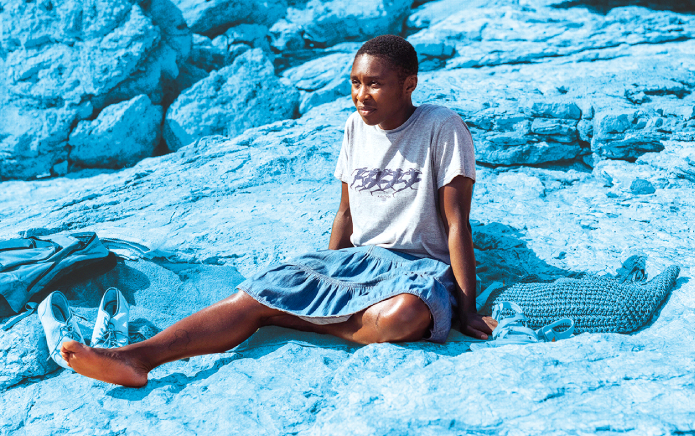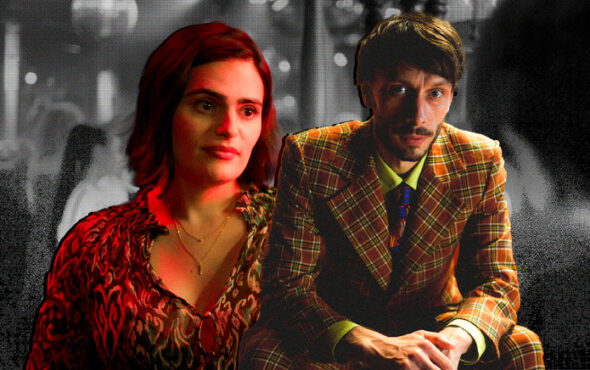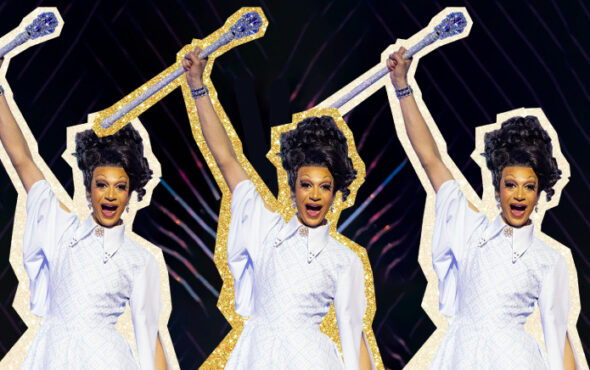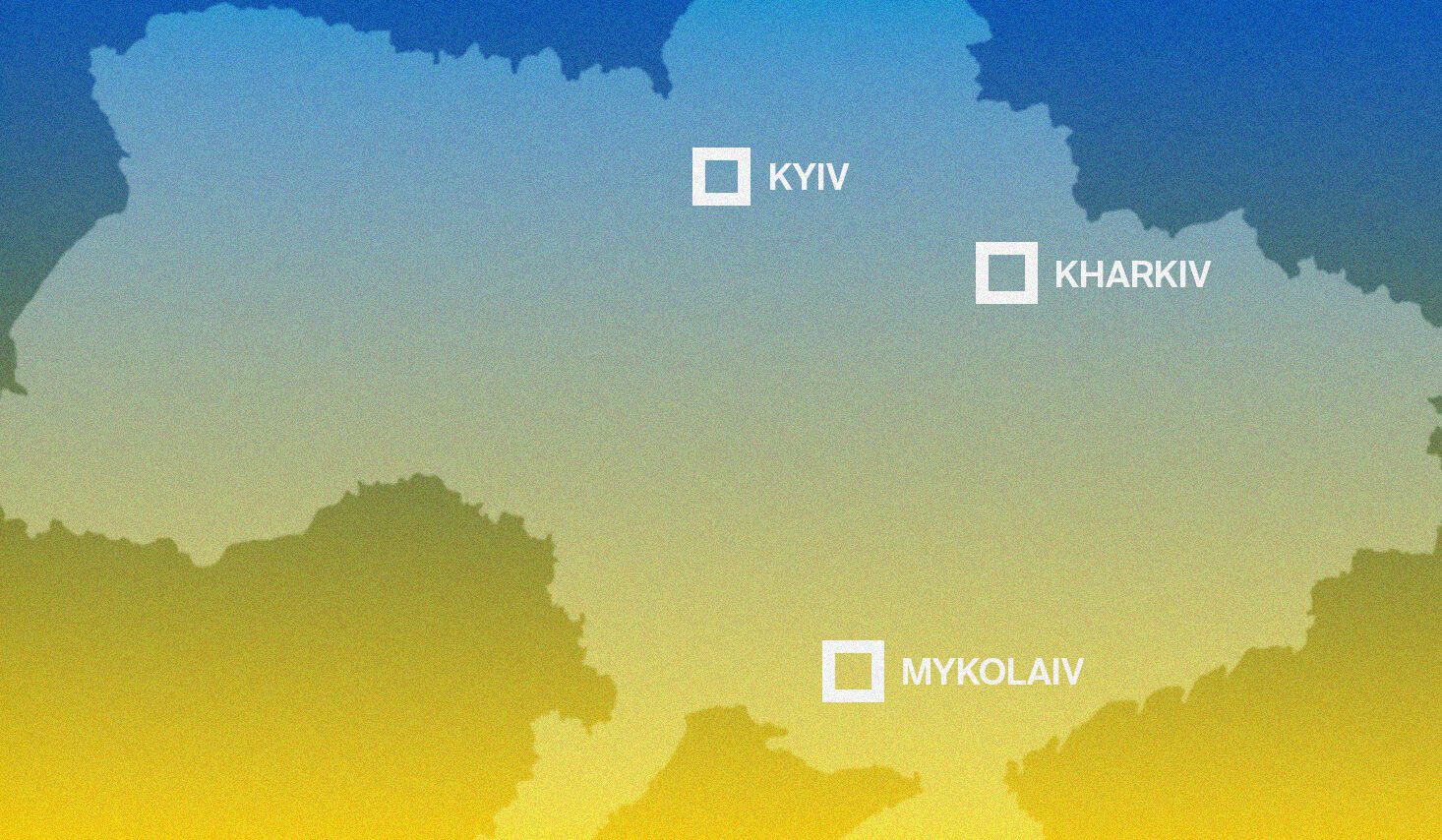
For months, Western officials reported that Russia was planning an invasion of Ukraine that could begin at any moment – something Vladimir Putin adamantly denied. In the early hours of 24 February, however, Ukrainian officials stated that Russia had launched an all-out assault on the country, with troops crossing the border. In the seven days that followed, thousands were killed and, according to the United Nations, more than one million people were forced to flee Ukraine – triggering what is likely to become a global humanitarian crisis.
Although there is still a lot of work to be done on LGBTQ+ rights in Ukraine, Russia’s long history of persecution against the community, such as its gay propaganda law and anti-gay purges in Chechnya, has left queer people in Ukraine terrified of what the invasion could mean for their future. GAY TIMES now speaks to three LGBTQ+ citizens from different parts of Ukraine, two of which remain there and one who managed to cross the border into Moldova, to gain an understanding of the situation on the ground and how they feel about the future.
Edward Reese, project assistant at KyivPride, has decided to remain in Kyiv and has full confidence in the Ukrainian army. “We hope, we believe and actually we know that we will win this war,” he tells GAY TIMES. “Surely with some losses, but we will win. If we fantasise, if Russia comes over Ukraine, for sure, it will be [the] darkest times because right now in Russia it is darkest times for queer people.”
To all our supporters in the world: Call on your governments to stand up and to take action against the war in Ukraine! We need to stop it now, we need to show how powerful we are all together, and Putin will stand no chance!
— KyivPride (@KyivPride) February 24, 2022
Despite inclusive policies like same-sex marriage being constitutionally banned and the country’s ongoing issues with the far-right, Edward explains that the Ukrainian government “is supporting gay rights” in a way that makes most LGBTQ+ people feel protected – something that may not be the case if Russia successfully occupies the country.
“So if, for example, we see Russia here, queer people will be affected by it and it will be much more scary to live here, much more dangerous to live here,” he tells GAY TIMES. “But, every queer person in Ukraine understands this, so that’s why some of us are in the army, some of us are giving comments to international media, some of us are working to help others, for example, children or people with disabilities or something like this, helping them to get out of the country right now, because they’re the most vulnerable.”
Kharkiv, Ukraine’s second largest city, has been subjected to intensive bombing since war broke out. Civilian areas have increasingly been targeted by Putin’s troops, who are yet to capture the region, resulting in the deaths of multiple people – including children. Vira Chernygina, a resident of the city who works with the Women Association Sphere NGO, a women’s and LGBTQ+ rights group, says “it’s impossible to leave Kharkiv because a lot of bombing” is taking place. She tells GAY TIMES that she hears explosions at least “every 30 minutes” and is already starting to learn how to distinguish different types of ammunition based on how it sounds. Vira adds: “For me, it’s like small bombs, if someone falls down or something like this, we already say, ‘It’s me. Don’t worry, it’s me.’ Because for seven days, already I know the sound of flight, the sound of ballistic rocket. It’s a terrible, terrible sound, bigger than even a big, military flight.” Vira’s call with GAY TIMES was interrupted multiple times by the sounds of explosions.
View this post on Instagram
"If we fantasise, if Russia comes over Ukraine, for sure, it will be [the] darkest times because right now in Russia it is darkest times for queer people.” - Edward Reese, KyivPride
Although safe routes out of the country are becoming increasingly limited, many Ukrainians have been able to cross the border over the course of the last week. Andrii, a representative of LGBTQ+ Association LIGA whose last name has been omitted for security reasons, was based in Mykolaiv until the day Russia launched its invasion. Just a week after his departure, the city’s mayor, Oleksandr Senkevych, announced that around 800 Russian vehicles, including a column of rocket launchers, were heading towards the region. Now in Chișinău, Moldova, he made the decision to leave his home with his mother to keep her safe. “I have my mum and she’s not really healthy and she’s not really young and I was really worried about her,” Andrii tells GAY TIMES. “We had to abandon our cats with our friend’s mother who didn’t want to go, but I understand that the life of a cat might be more negligible right now than the life of a person, so yeah. It’s still not, you know, I still feel heavy in my heart because of everything that’s going on in Ukraine.”
For a vast majority of Ukrainians, life as they knew it mere days ago has completely changed. Many now sleep in bomb shelters worried about where their next meal will come from, with others enlisting in the army to join the fight for their country. Vira knows of a lot of LGBTQ+ people who have “tried to volunteer,” including one of her friends. “There were a lot of volunteers and service volunteers,” she explains, fighting back tears. “She was my friend, several friends, and one of them we cannot connect with here and I’m praying that she is alive. But already [it has been] 27 hours, we don’t know if she is.” Andrii is in regular contact with friends and family still in Ukraine, where life changes every day for them. He says: “They’ve sent us pictures of the circumstances they’re staying under. And it’s really awful because it’s a sealed concrete – nowhere to sit, nowhere to stand. They don’t really have blankets to cover themselves, and they can’t like, they can’t even sleep there. It’s really awful. And they also informed us that some of the supermarkets in Mykolaiv are raising prices for food, which is really unacceptable. Unfortunately, the city major cannot really do anything about this right now because they have much more pressing problems.”
A lot of the people Andrii knows are “trying to stay positive, but it’s getting really much more difficult, especially under the circumstances of being bombed or shot at.” He continues: “What I’ve heard and what I personally think is that, God forbid, that Russia would occupy Ukraine or any other regions right now because we believe and we think that probably, those who are active rights defenders, no matter if it’s LGBTQ+ or other human rights defenders, I think we’re all, we could be all under attack or under life threats from Russian Federation.”
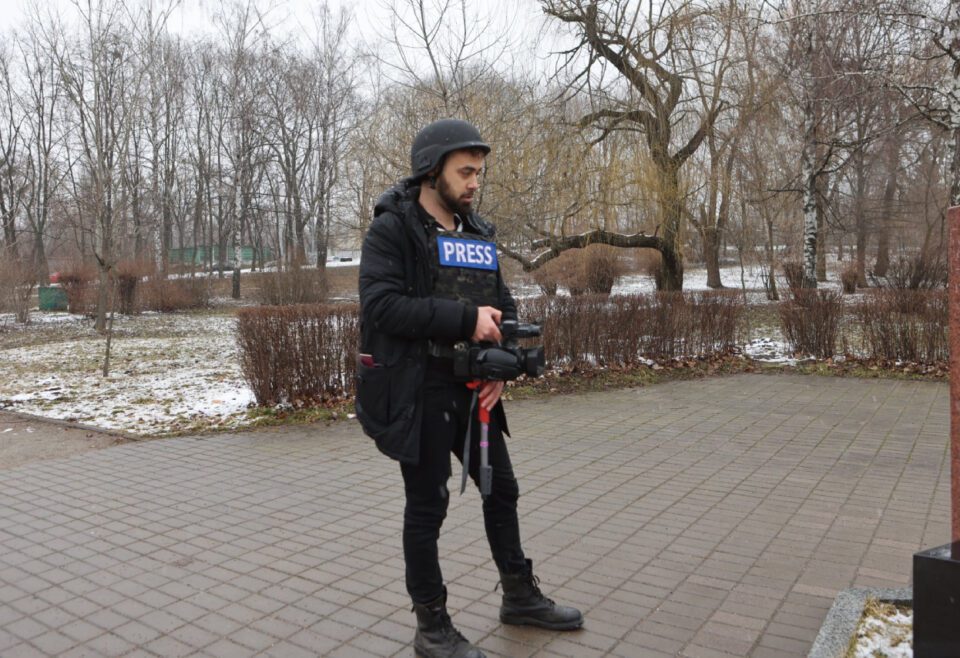
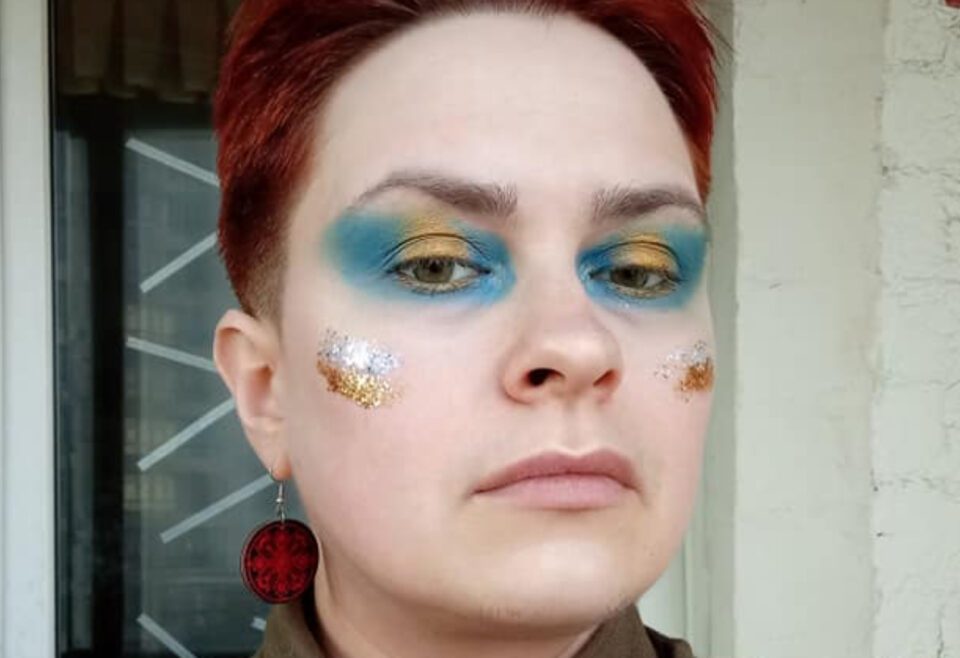
Many journalists have remained in Ukraine to accurately report on the situation there, despite potential security threats they may face in the coming days and weeks. Speaking to GAY TIMES, Oz Katerji, a freelance conflict journalist, writer and filmmaker who has been in Kyiv for three weeks, explains the importance of having objective voices on the ground: “In Ukraine, it seems like there is an understanding that journalism is important to the war effort. Telling the truth about what’s happening here to the wider world is important to the war effort. That’s not to say journalists are categorically not acting as propagandists for the Ukrainian government. We are here to report… and we’re here to report objectively about what’s happening to these people. And these people understand that for the world to see them and to understand their struggle, they need people to come here and report objectively to the audiences back home.”
Good morning, this is Kyiv calling.
Eight days after Ukraine was invaded by a fascist dictatorship with one of the most powerful military forces on earth, this city’s defences are still holding.
We are still here.
We will remain here.#Kyiv
— Oz Katerji (@OzKaterji) March 4, 2022
In Russia, many LGBTQ+ issues are censored by the government, as well as the mainstream media. Last year, Reporters Without Borders ranked the country at 150 out of 180 others in its Press Freedom Index because of “the gradual disappearance of independent media” there. On 4 March, it was reported that the BBC had its Russian website restricted by the state’s communications watchdog, who also limited Radio Liberty and the Meduza media outlet. Edward is hopeful that sanctions imposed by international governments, as well as independent reporting, will encourage Russian citizens to protest the war and bring an end to it from “inside the country.” He continues: “Because right now we see that there are some activities, but it’s very small because many people in Russia are very, very, very ‘zombified’ by the media, by the local media and by propaganda.”
Edward says that international support is doing a lot for the morale of people in Ukraine: “We actually see the great support from Great Britain and, in Ukraine, when Boris Johnson makes his speeches about Russia, we are like,” he says, clapping his hands together. “We all watch it, and we all are very happy how he’s delivering it.”
Although sanctions have begun taking effect in Russia, with its currency reaching a record low against the US dollar, for example, it can be hard for some Ukrainians to take comfort in this as fighting gets closer to home. “And my question to all [the] world, please close our sky, please, it’s important,” Vira says, referring to a potential no-fly zone that would see her country’s airspace closed by the West. “Please continue to support the Ukrainian people. Ukrainian people [are] in danger and need to close [the] sky.”
Steve Taylor, a board member at the European Pride Organisers Association (EPOA) who is currently in Denmark, thinks the looming refugee crisis needs to be addressed sooner than later. “I think all governments have a responsibility to take refugees, I mean, that’s not just Ukraine, that’s from anywhere,” he explains to GAY TIMES. “And of course, the problem in the UK, which shames me to say I’m British, is that the government just keeps pulling up the ladder.” Steve believes the “pariah Home Secretary” Priti Patel “needs to do something to support Ukraine” as soon as possible. “So I think there’s a lot that governments need to do and recognise that LGBTQ+ people are some of the first that should be supported because they are at the most risk from the Russian regime,” he adds. “Also, political refugees, you know, those who have been part of the Ukrainian political or government, you know, they’re going to be at risk because they’ll be seen specifically as dissidents.”
🏳️🌈 The rainbow flag WILL fly again in Ukraine. 🇺🇦
Support @KyivPride and @KharkivPride, their people and communities: https://t.co/um3mL6bdUm#StandWithUkraine #Ukraine pic.twitter.com/VslUblQGTO
— EuroPride • EPOA (@EuroPride) February 26, 2022
"I don't know how to finish this day. I don’t know how to finish this hour." - Vira Chernygina, Women Association Sphere NGO
What the future holds for Ukraine’s citizens remains increasingly unclear. On 28 February, the UK committed to taking a further 100,000 refugees from the country, with many fleeing westward as a result of fighting predominantly taking place in the southern and eastern regions. “And you know, there are already people fleeing into Poland, into Moldova, into Romania, into Hungary,” Steve explains. Looking to the future, he acknowledges that “people will want to go home” when they are able to do so – but we need to do all we can to keep them safe in the meantime. “But Poland, as we know, is not a great place to be LGBTQ+,” he continues. “I mean, you’re safer there than you are if you’re still in a Russian-controlled Ukraine, but it is not great there and so we need to think about, how are we going to support LGBTQ+ people specifically to go further west and to safety?” This is the case for Andrii, who is “hopeful” Ukraine will “win this war” as soon as possible. “But I actually hope to come back,” he explains. “I want to help in any way possible. I just need to understand that my mother is safe for now and I’m going to come back.”
For those who never left Ukraine, such as Vira, hope remains that war will end “as soon as possible.” In the meantime, however, looking to the future is a much tougher prospect than it was just two weeks ago. “I don’t know how to finish this day. I don’t know how to finish this hour,” Vira says. Oz plans to remain in Ukraine reporting on the war for as long as possible. “My calculation is that some journalists still have to stay, that there are millions of people still in the city, that are people still living in my building, Ukrainians living in my building…I owe these people no less than to be here and to experience that shoulder to shoulder with them.” Edward is also committed to staying in his country. “I had thought about leaving, but every day I see people who stay, who fight. I have a little chat, a community for non-binary and trans youngsters, and I am an admin there. And today those children asked me where they can volunteer, what they can do to help Ukraine. And I just, how can I leave if these children stay and they want to help? So, right now I am.” In the meantime? His message for Putin is simple: “Everything we want right now is Russia to just get the fuck out of Ukraine in every way. Don’t touch us in any way. Get your culture out. Get your soldiers out. Get your ideas out. Get your conservatism out.”
Kyiv and Kharkiv Pride are both taking donations through EuroPride, 100% of which will go to the organisations. To make a donation or learn more, click here.
More information on how you can help LGBTQ+ people in Ukraine can be found here.
Those featured in the story consented to having their names and titles printed in full. Andrii’s full name and title were not shared for security reasons.
